Gigabyte Z68X-UD3H-B3 Review
by Brendan van Varik on July 11, 2011 7:01 AM EST- Posted in
- Gigabyte
- Motherboards
- Sandy Bridge
- Z68
LAN Speed Test
LAN Speed Test is a freeware program designed for testing the network connection between two PCs on a home network. The speed of the transfer is limited by the lowest common denominator on the network, so if you have gigabit Ethernet capable computers but a 100 Mbit capable router, you are limit to 100 Mbit transfer. Note that this is really a formality – if a network port is rated at 1 Gbps, then chances are that it will hit at least 90+% of this value. The main test here is CPU usage, and how much is offloaded by the controller. For this test, we use LAN Speed Test to transfer a 1000 MB file across a home network with a 100 Mbps lowest common speed to the same machine each time, in a read/write scenario. CPU usage is taken as a visual max/average from task manager.
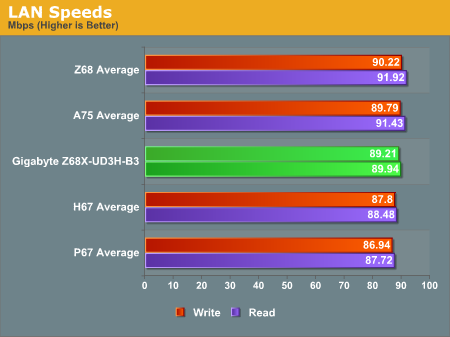
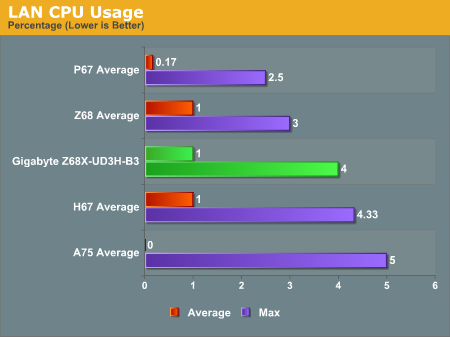
Good to see the Realtek controller doing its job properly here - the board is certainly a very strong contestant in the networking department.
DPC Latency
Deferred Procedure Call latency is a way in which Windows handles interrupt servicing. In order to wait for a processor to acknowledge the request, the system will queue all interrupt requests by priority. Critical interrupts will be handled as soon as possible, whereas lesser priority requests, such as audio, will be further down the line. So if the audio device requires data, it will have to wait until the request is processed before the buffer is filled. If the device drivers of higher priority components in a system are poorly implemented, this can cause delays in request scheduling and process time, resulting in an empty audio buffer – this leads to characteristic audible pauses, pops and clicks. Having a bigger buffer and correctly implemented system drivers obviously helps in this regard. The DPC latency checker measures how much time is processing DPCs from driver invocation – the lower the value will result in better audio transfer at smaller buffer sizes. Results are measured in microseconds and taken as the peak latency while cycling through a series of short HD videos - under 500 microseconds usually gets the green light, but the lower the better.
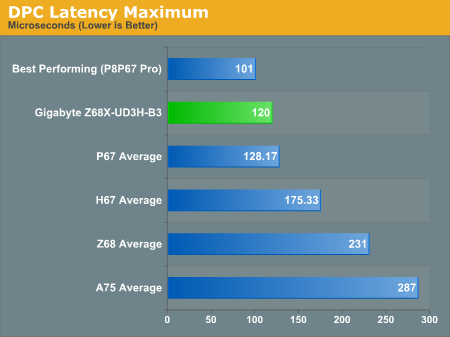
The Gigabyte performs very well - 120us is lower than almost all the other motherboards.
USB Speed
For this benchmark, we run CrystalDiskMark to determine the ideal sequential read and write speeds for the USB port using our 64GB Patriot SuperSpeed USB 3.0 drive. Then we transfer a set size of files from the SSD to the USB drive, and monitor the time taken to transfer. The files transferred are a 1.52 GB set of 2867 files across 320 folders – 95% of these files are small typical website files, and the rest (90% of the size) are the videos used in the Sorenson Squeeze test.
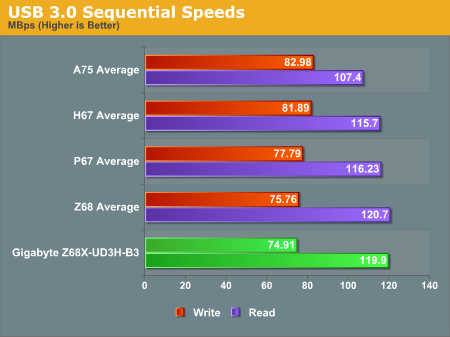
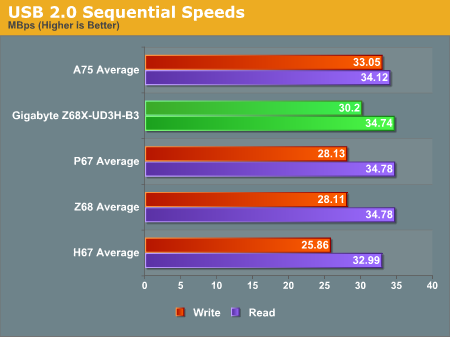
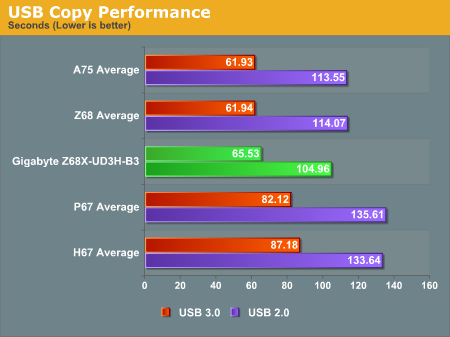
The USB2.0 speeds are more or less all the same. However, this board really shines when it comes to the write speeds. It’s on average 5MB/s faster than most of our boards we’ve tested and is only really contested by ASRocks’ XFast technology. The copy time is fairly average. On the USB3.0 side of things, the results are not anything spectacular.
SATA Testing
We also use CrystalDiskMark for SATA port testing. The operating system is installed on the SSD, and the sequential test is run at the 5 x 1000 MB level. This test probes the efficiency of the data delivery system between the chipset and the drive, or in the case of additional SATA ports provided by a third party controller, the efficiency between the controller, the chipset and the drive.
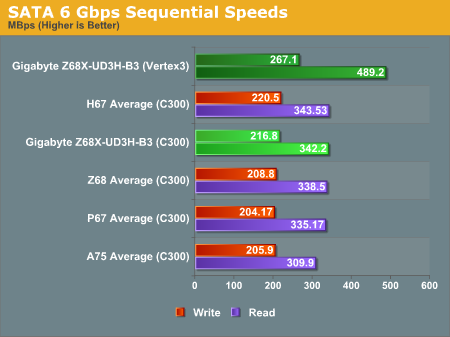
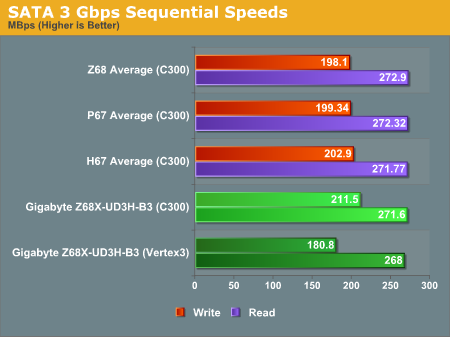










70 Comments
View All Comments
kamiyo - Tuesday, July 12, 2011 - link
hopefully this will inspire me to upgrade the rest of my rigbas94041 - Tuesday, July 12, 2011 - link
Why do reviews such as this ignore that which is fundamental to product quality?Namely, Customer Support.
I will never purchase another Gigabyte product as in my experience their support is incompetent and unprofessional.
Until these tech companies are called out on it they will continue to provide abysmal support. Product reviews should provide a measure of tech support capacity just as they measure a products technical features.
just4U - Tuesday, July 12, 2011 - link
I've played with this board and it's little cousin, the GA-Z68MA-D2H-B3. I've found that both boards are a little quirky almost as though the bios versions are not quite mature. Small little nagging things that are hard to pin down.The SSD Caching is an interesting feature. I don't notice a big improvement but it's there for sure... even though the Windows 7 Experience index doesn't show it. If you change hardware frequently then you run into issues as well (or I have anyway) forcing you into the setup utility to disable the cache drive and reset it back up after the fact. Things have gotten better since the last bios update but... not quite there yet. (imo)
The0ne - Tuesday, July 12, 2011 - link
No gimmick, just a great show if you are interested. For the linguist or anyone interested in words and such, the program runs every week on the weekends. I highly recommend it as I listen to them weekly.http://www.waywordradio.org/
Hope you enjoy them as much as I do :D
henhaohenhao - Wednesday, July 13, 2011 - link
Come go and see, will not regret it Oh look
http://www.ifancyshop.com
henhaohenhao - Wednesday, July 13, 2011 - link
Come go and see, will not regret it Oh look
http://www.ifancyshop.com
Diagrafeas - Saturday, July 16, 2011 - link
This is from the manual."Please note the HDMI audio output only supports AC3, DTS and 2-channel-LPCM formats."
Is this correct?
What about 8-channel LPCM, Dolby TrueHD bitstream, DTS-HD Master Audio bitstream?
goodzhang - Sunday, July 17, 2011 - link
Come go and see, will not regret it Oh lookhttp://www.ifancyshop.com
catchmyevo - Monday, July 25, 2011 - link
Brendan,Thank you for posting an article for this Motherboard, as it made my decision to buy it. One thing though, I wasn't sure if you had come across this but after upgrading the BIOS from F2 to F4, the option to set ACPI Suspend Type S1(POS)/S3(STR) disappeared. Any ideas as to why they would make a change to fix some issues, but removed a feature that's printed in their manual?
Conditioned - Wednesday, July 27, 2011 - link
First review I read of a motherboard that gives dpc. Thats so great for us who play (and ofc for those that do audio processing).For the next review I would like to know:
Was the system under load as you took those dpc measurements? Listening to music, harddisk usage, anything loading the cpu?
Was it in 'idle' mode or was it 'clocked' up?
Where sounddrivers installed? Which ones.
Was hpet on or off?
What nic (model and driver version).
What intel inf version.
I wonder at these numbers cause I have ~60 microseconds in dpc with my msi z68 gd80.
I have done two things to lower dpc:
1) Install brainbits low dpc drivers for my Asus essence
2) I have timerresolution.exe running which increases the dpc timer resolution thereby possibly decreasing dpc somewhat.